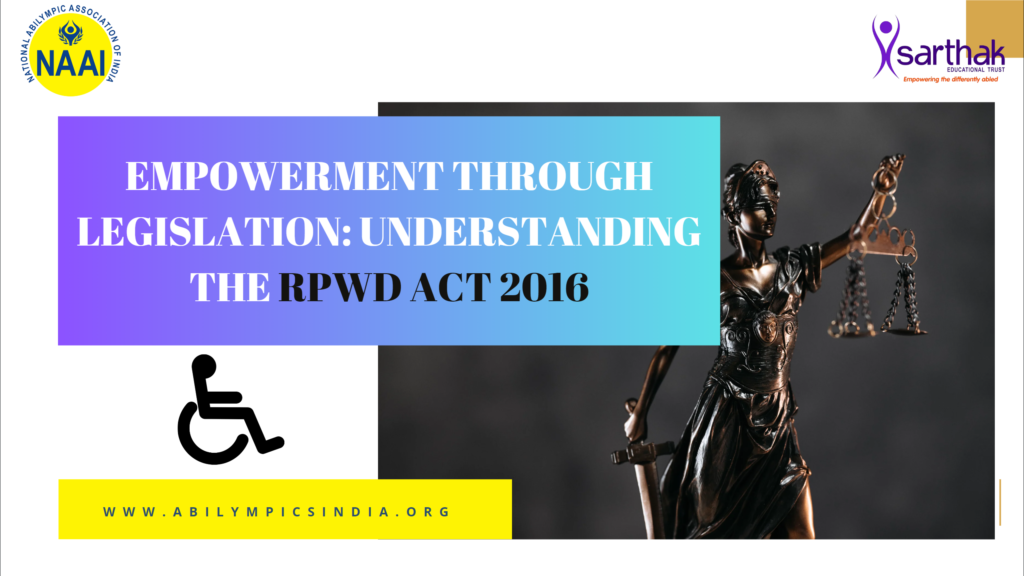Introduction:
In today’s world, inclusivity and empowerment for all individuals, regardless of their abilities, are essential. The Rights of Persons with Disabilities (RPwD) Act 2016 is a significant legislative step towards achieving this goal in India. This blog aims to delve into the provisions of the RPwD Act 2016, highlighting its importance in fostering empowerment and inclusivity. Additionally, we’ll explore the efforts of organizations like the Sarthak Educational Trust and the National Abilympic Association of India (NAAI) in promoting the rights and abilities of persons with disabilities.
Understanding the RPwD Act 2016:
The RPwD Act 2016 replaces the Persons with Disabilities (Equal Opportunities, Protection of Rights and Full Participation) Act, 1995. It is a comprehensive legislation that aims to protect and promote the rights of persons with disabilities in various aspects of life, including education, employment, accessibility, and social security.
Education:
One of the significant aspects of the RPwD Act 2016 is its emphasis on education. The Act mandates that every child with a disability has the right to free and compulsory education up to the age of 18 years. It also ensures that educational institutions provide necessary support and facilities to enable full participation and inclusion of students with disabilities.
Employment:
The RPwD Act 2016 recognizes the right of persons with disabilities to equal employment opportunities. It prohibits discrimination in recruitment and promotion processes and mandates that the government and private sector organizations reserve a certain percentage of vacancies for persons with disabilities.
Accessibility:
Accessibility is crucial for persons with disabilities to fully participate in society. The RPwD Act 2016 requires the government to take measures to ensure accessibility in public buildings, transportation, information, and communication technologies, among other areas. This provision aims to remove physical, communication, and attitudinal barriers that hinder the participation of persons with disabilities.
Social Security:
The Act acknowledges the vulnerability of persons with disabilities and provides for various social security measures to support them. It includes provisions for disability pension, insurance schemes, and assistance for caregivers of persons with disabilities.
Role of Sarthak Educational Trust:
Sarthak Educational Trust is a non-profit organization committed to empowering persons with disabilities through education and skill development. The trust works towards creating inclusive educational environments and providing vocational training to enhance the employability of persons with disabilities. Through its initiatives, Sarthak Educational Trust plays a significant role in realizing the objectives of the RPwD Act 2016.
Role of NAAI:
The National Abilympic Association of India (NAAI) is dedicated to promoting the talents and skills of persons with disabilities through competitive events known as “Abilympics.” These events provide a platform for persons with disabilities to showcase their abilities in various vocational skills, arts, and crafts. By recognizing and celebrating the abilities of persons with disabilities, NAAI contributes to changing societal perceptions and promoting inclusivity.
Conclusion:
The Rights of Persons with Disabilities Act 2016 is a landmark legislation that upholds the rights and dignity of persons with disabilities in India. Through its provisions on education, employment, accessibility, and social security, the Act aims to create an inclusive society where every individual can participate and contribute fully. Organizations like the Sarthak Educational Trust and the National Abilympic Association of India play crucial roles in complementing the objectives of the Act by empowering persons with disabilities and promoting their abilities. Together, we can work towards building a more inclusive and equitable society for all.

